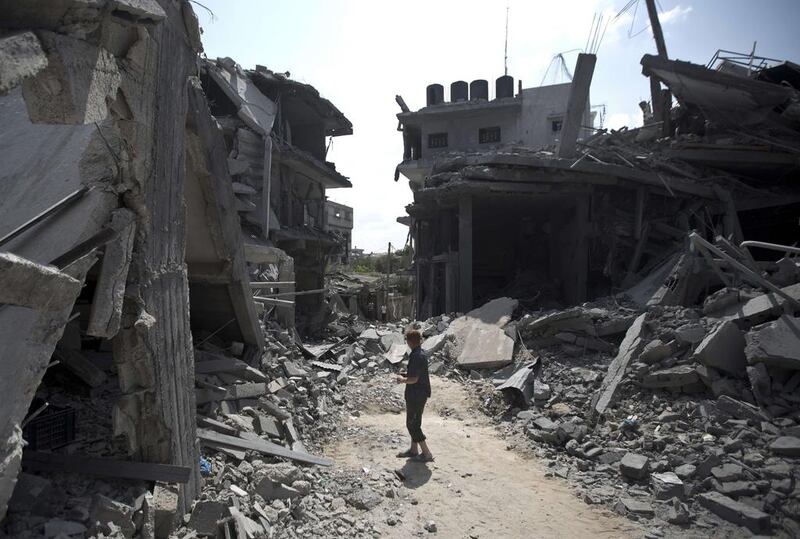Since its UN status was upgraded to non-member observer status in November 2012, the Palestinian Authority (PA) has repeatedly threatened to join the International Criminal Court. It is bad enough that this has not yet happened despite the greater urgency caused by Israel's recent Gaza onslaught. However, the PA is now reportedly preventing the launch of an ICC investigation into alleged war crimes committed in Gaza.
This is despite Palestinian foreign minister Riad Malki saying last month that “we must do everything within our power to enable” the court “to bring to justice those responsible for committing war crimes”.
This is a dereliction of the PA’s duty towards its people. Israel killed and injured thousands in Gaza – the vast majority of them civilians – displaced hundreds of thousands and devastated the territory’s infrastructure. It is inexcusable that Palestinians should be denied justice by their own leaders. As Amnesty International said last month, an ICC investigation “is crucial to end the pervasive culture of impunity”.
There is no justification for the PA’s failure to join the ICC, which was the greatest benefit of its upgraded UN status, and the reason for the vehement opposition of Israel and its allies. It is commonly speculated that the PA views this as leverage in negotiations. However, a bargaining chip is only worth something if there is the real potential for its use. The PA has made it a hollow threat.
If it thinks it can force concessions, it should be noted that Israeli prime minister Benjamin Netanyahu has refused to consider many fundamental Palestinian requirements, including the complete lifting of the blockade on Gaza, and has stalled discussions on others, such as provision of a seaport and airport.
Mr Netanyahu is even less likely to offer meaningful concessions given the domestic pressure he is under. His approval ratings have plummeted from 82 per cent when he launched the ground invasion, to just 38 per cent after he accepted the ceasefire.
Regarding Palestinian statehood, Mr Netanyahu said in July that “there can’t be a situation, under any agreement, in which we relinquish security control of the territory west of the River Jordan”. In other words, the West Bank.
“That sentence ... spells the end to the notion of Netanyahu consenting to the establishment of a Palestinian state,” said Times of Israel editor David Horovitz.
So what is the PA holding out for? Its limitless patience is being met with daily Israeli violations of Palestinian human rights and further occupation of their land, including the announcement this month of the largest land-grab in the West Bank in 30 years.
The PA is under immense pressure from Israel and its allies to avoid the ICC, but this should not trump the legitimate rights and grievances of the Palestinian people. Human Rights Watch noted that those “who are pressuring Palestine not to seek the ICC’s jurisdiction cannot credibly argue that continued impunity for serious international crimes will help bring the conflict to an end”.
There had been speculation that an ICC bid was complicated by the fact that it would also investigate allegations of Hamas committing war crimes. However, this is no longer an issue given the group’s recent support for the initiative.
Yet still the PA is dragging its feet, thereby risking the further deterioration of the intra-Palestinian reconciliation process. Hamas leader Ismail Haniyeh urged the authority on Friday to hold Israel accountable at the ICC, adding that this “is the right for every victim, and stalling is neglecting their rights”.
The PA’s obstructionism is self-defeating, making its domestic position less tenable. It is under increasing criticism for not having anything to show for decades of negotiations. Meanwhile, Hamas’s popularity among Palestinians has soared to “unprecedented” levels following Israel’s Gaza onslaught, according to a Palestinian Centre for Policy and Survey Research poll published this month.
The PA’s refusal to join the ICC will further cement this trend. More than three-quarters of Palestinians want to turn to the court, even if it leads to the PA’s collapse, according to a poll published in June. This sentiment will have undoubtedly increased since.
Perhaps the greatest tragedy in all this is that the PA's conduct – and particularly that of President Mahmoud Abbas – is not surprising. Chief Palestinian negotiator Saeb Erekat said his last of several resignations, in November 2013, was because Mr Abbas had refused to sign on to the ICC. Mr Erekat gave assurances in February this year that the PA would apply to the court at the end of April. Almost five months have passed since this broken promise.
Mr Abbas is vindicating those who believe that he and the PA are managing the occupation rather than ending it, and serving Israel’s interests rather than their people’s. Indeed, in May he described security coordination with Israel as “sacred” – a comment met with widespread disgust. Mr Al Malki has also made assurances that as long as Mr Abbas is in charge, “there will be no third intifada”.
So the PA is not only willing to put down an uprising by its own people, but to obstruct a primary means of peaceful resistance against the occupation.
“People should give the Palestinian leadership the courtesy of selecting the appropriate time” to join the ICC, said Riad Mansour, the Palestinian ambassador to the UN. The PA has squandered that costly courtesy. The appropriate time is long overdue.
Sharif Nashashibi is a journalist and analyst on Arab affairs





